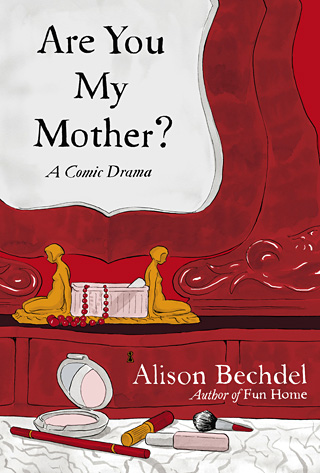
This is our last discussion question for Are You My Mother? by Alison Bechdel.
Our next book is Imagine: How Creativity Works by Johah Lehrer.
You can read about the selection of the book for the club here.
You can order the selection here.
Please finish reading or listening to the the book by June 30th.
Our week-long discussion begins on July 1st right here. Happy reading!
• • •
Join the discussion any time!
Are You My Mother? A Comic Drama is written and illustrated by Alison Bechdel and published by Houghton Mifflin Harcourt in 2012.
• • •
This quote is from an interview from The Rumpus:
Rumpus: Has your mom read the new book yet?
Bechdel: Yeah, she’s read it. I mean, I showed it to her as I was working on it. I felt like I had to do that so she wouldn’t totally freak out, you know? I didn’t feel like I could write about her without her seeing it. You can’t just show someone a finished published book about them, it’s really not fair.
Even though the author let her mother read the book as she wrote it, she seems to have felt a greater sense of freedom and comfort using her father as the subject matter for a book than she did with her mother and her second graphic memoir.
Where do you stand on these matters? Do you feel that it’s easier and more advantageous for a memoirist to write about other people after they have passed away? Or is that unfair to the subject, since he or she does not get to have a voice?
When writing about a living person, what kind of permissions, if any, does a memoirist need to procure?
Could you feel ethical writing about someone no longer living?
Could you feel ethical writing about someone still living, with or without permission?
What are the rights of the memoirist and what are the rights of the people being written about?
How do you feel about these matters?

Comments on this entry are closed.
It looks like I’m hanging out here on my own….
On the subject of “the rights of the memoirist” vs. “the rights of the people being written about” There is my confusion and then the general confusion. I searched, and I didn’t like everything I found, but this quote from Sue William Silverman, at the West Hollywood Book Festival seems appropriate: “The truth is when you write memoir, you are writing your truth as you remember it. It is no one else’s truth. It’s your own. You can be sued by a family member, but they might not be able to win the suit. They need to prove that what you wrote is a lie and often this is very difficult to do. When writing memoir, in either the short or long form, the best advice is to be as honest as possible.”
Regarding the living vs the no longer living, I don’t feel that it’s more or less ethical to write about either the living or the dead. The disadvantage is that you can’t interview the dead. The disadvantage with the living is that they may not like seeing themselves as they appear to you. That doesn’t change the fact that we all have the right to share our life stories, as best we can, from our own perspective.
I think if you do it honestly and watch out for any libel, you are ok with living or dead. Yet I can see why people would be afraid to tell some stories while people in them are still alive. I heard a well known Canadian author, David Adams Richards discuss one of his books which was a fictionalized version of his grandmother’s life and he felt he could not have written it while his dad was alive as his father’s character figured prominently in the book and only he would know what was truth and what was fiction. I suppose by fictionalizing it he had some safety.
Even with interviewing people being written about I often feel the “truth” is never quite as people remember, or it is different for each person.
Good comments from Sue and MLTCG. Writers are told to tell the truth and yet I wouldn’t want someone telling my part in a story (unless I agreed with it.) I agree with Silverman (“you are writing your truth as you remember”) and can attest that personal perspective changes everything. Very interesting question and as Christina said, quite pertinent to present and future memoir writers. Changing topics: are any ladies using the term ‘femoir’ yet?